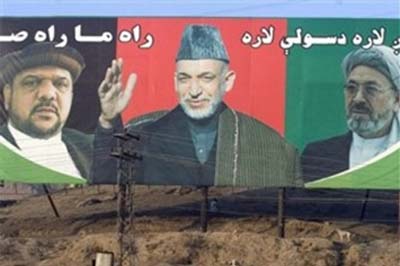Atta boasts a reputation as one of the credible mujahideen commanders against the Soviet occupation of Afghanistan in the 1980s, and was a close ally of the legendary anti-Soviet and anti-Taliban commander,Ahmed Shah Masood, who was assassinated by al-Qaida agents two days before the tragic events of 11 September 2001. Following the US-led intervention eight years ago, Atta and Dostum joined forces to drive the Taliban out of the north, but soon their relationship fell apart as they engaged in a power rivalry, with Karzai eventually appointing Atta as the governor of Balkh. However, Atta, like many other former mujahideen commanders, has grown disillusioned with the Karzai government and its recently renewed alliance with Dostum for the purpose of winning the votes of Afghanistan’s Uzbek minority, despite the unsavoury character of the Uzbek warlord. Atta threw his weight behind Abdullah, which immediately drew the wrath of Karzai, and more importantly his interior minister, Mohammed Hanif Atmar, a former pro-Soviet communist whom Atta had fought during the Soviet occupation.
Atta has now accused Karzai and Atmar of deploying forces against him in the north and airdropping troops by helicopters in night flights. Karzai has admitted that armed men have been ferried by ‘unidentified’ helicopters. He promised an investigation – something that Atta has rejected, holding Karzai and Atmar responsible for the development.
Whatever the case, Atta is reasonably armed, with a popular based of support. He has the capacity to disrupt the northern routes of supply to Nato forces, and to do whatever it takes to defend his territory against the Karzai government, which since the fraudulent election of 20 August has no constitutional status. In this, he will have the support of a majority of people in northern Afghanistan, who have strongly voted for Abdullah. If Karzai is declared the winner of the election, the current standoff could easily result in a major bloody confrontation, with a widespread destablisation effect on the north, which has until recently been fairly peaceful.
The Atta episode is a microcosm of larger difficulties in a country where the state is very weak and society very strong – a society that is made up of numerous micro-societies and local power-holders or ‘strong men’, capable of challenging that authority of any central government. This is especially so if that government is viewed as illegitimate and a foreign puppet by a majority of the population.
So far most of the energy of the US and its allies has been focused on containing the Taliban insurgency in the south and east along the border with Pakistan, even though unsuccessfully. If the north falls apart, it would enormously benefit the ethnic Pashtun Taliban by default, as the non-Pashtun people of the north have all along been very hostile to the Taliban, given the militia’s brutal treatment of them during its rule from 1996 to 2001.
Under such circumstances, the US and its allies will have the whole country in revolt, which it will not be able to quell without massive troop deployment. Since a troop surge on a large scale is not on the cards – given the growing opposition to it in the troop contributing countries, Afghanistan faces an incredibly bleak future. To avoid a bigger disaster than it has had so far, it is critical for the international community to make sure that the outcome of the presidential election is the creation of a legitimate government that can attract the support of a cross-section of Afghanistan’s mosaic society.
The way forward may be to work for a government of national unity to include the Karzai and Abdullah camps, based on a common set of principles. Although Abdullah has thus far remained opposed to such a government, in the final analysis he may find it to be in the best interest of Afghanistan. Otherwise, all alternatives could only widen the massive political and strategic vacuum that the Karzai’s corrupt and inept rule has created in the last years. The Taliban have been the biggest winner from this vacuum up to this point, but may prove to be even more triumphant if Afghanistan continues to lack a credible government.
This article first appeared here in the Guardian.

